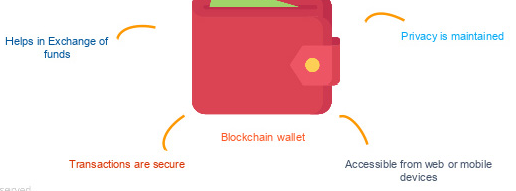Explain about BlockChain wallet
Due to their many advancements over conventional fiat currencies, cryptocurrencies such as Bitcoin and Ethereum are becoming increasingly common. You will need to understand how Blockchain wallets operate if you want to use any of these Blockchain-based cryptocurrencies.
The article describes what Blockchain wallets are, explains why you should use a blockchain wallet, and describes the various types of Blockchain wallets. A demo on the use of blockchain wallets is also included.

Why Use a Wallet with a Blockchain?
There are some issues with conventional banking systems when making any transaction. Transactions are sometimes sluggish, for one thing. For another, an intermediary, such as a bank, must move through every transaction, meaning there is a central point of failure. And in keeping track of all accounts and balances, there are problems; records may be jeopardized, distorted, or even compromised across various networks where accounts and balances are stored. These issues are minimized or removed by blockchain wallets.
What's a Wallet Blockchain?
A Blockchain wallet is a wallet for cryptocurrencies that enables users, such as Bitcoin or Ethereum, to control various forms of cryptocurrencies. A blockchain wallet allows anyone to quickly exchange money. Transactions, as they are signed cryptographically, are free. The wallet can be accessed from web devices, including mobile ones, and the user's privacy and identification are protected. Therefore, a blockchain course wallet offers all the features needed for secure and protected transactions and exchanges of funds between various parties.
The method of sending or receiving money via PayPal or every other gateway used today is quite similar, except instead you use cryptocurrency. Electrum, Blockchain.info, Jaxx, Mycelium, Samurai, and the Bitcoin paper wallet are examples of blockchain wallets. Based on the requirements you have and the protection you need, there are several more.
How Do Wallets Work with Blockchain?
Next, let's explain what private and public keys are and how a blockchain wallet relates to these keys. You are given a private key and a public key that is associated with your wallet once you create a blockchain wallet. As an example, let's use email. You send him or her your email address if you want to receive an email from anyone.
But giving out your email address doesn't imply that anyone may send emails from your account. Someone will have to know the password for your email address to do so. Using a public key and a private key together, blockchain wallets follow a similar method. As your email address, a public key is similar; you can send it to anyone. A public key is developed when your wallet is created, and you can share the public key with anyone to receive funds.
Top Secret is the private key.
Your password is similar. It should not be compromised and you should not reveal it to anyone. This private key is used by you to invest your funds. There is a strong chance that your account will be hacked if someone has access to your private key, and you might end up losing all the cryptocurrency deposits in your account.
Features of the Blockchain Wallet
It is imperative that you know about their features now that you know how Blockchain wallets work. Here are some of the essential features of wallets from Blockchain:
- Simple to use.
It's just like any other app that you use for your everyday purchases or a wallet.
- Highly stable.
It's just a matter of your private key is secured.
Enables immediate transactions through geographies.
And these, without intermediaries, are barrier-free.
- Low fees on purchases.
There is a much lower cost of exchanging funds than with conventional banks.
Requires multi-cryptocurrency transactions. It allows you to do quick currency conversions.
Wallet Forms for Blockchain
There are two types of private-key-based blockchain wallets: hot wallets and cold wallets. Hot wallets are like regular wallets that we carry, and these wallets are user-friendly for day-to-day transactions. Cold wallets are similar to a vault; with a high degree of security, they store cryptocurrencies.
Cold Wallets and Hot Wallets
Hot wallets are online wallets from which it is possible to easily pass cryptocurrencies. They're open online. Coinbase and Blockchain.info are examples. Cold wallets are offline digital wallets where the transactions are offline signed and then online disclosed. On the internet, they are not kept in the cloud; to provide high security, they are kept offline. Trezor and Ledger are examples of cold wallets.
With hot wallets, private keys for quicker transfers are stored in the cloud. Private keys are stored with cold wallets in separate hardware that is not connected to the internet or the cloud, or stored on a paper document. Hot wallets can be easily accessed 24/7 online and can be accessed via a desktop or mobile device, but if compromised, there is a chance of unrecoverable theft. The form of the transaction helps to protect the wallet from unauthorized access (hacking and other online vulnerabilities) with cold wallets.
Types of Wallets with Blockchain
Further, we can break down wallets into three kinds:
Wallets for Software;
Wallets with hardware that you insert into your USB drive; and
Typical paper-based wallets for which you print a piece of paper with your public key and private key and keep it in a safe location.
Wallets for Applications
An application that is downloaded on a computer is a software wallet; it could be a desktop or a mobile device, or it could be a web-based wallet that can be accessed online. Popular app wallets are Breadwallet, Jaxx, and Copay. Software wallets can be further classified as desktop wallets, online wallets (web wallets), and mobile wallets.
Forms of Wallets for Software
Wallets for Desktops
Desktop wallets are cold wallets in which cold servers (on your desktop) store your private keys. You can unplug your wallet from the site, do some offline transactions, and then get it back online. A cold server, essentially your laptop, is used as a backup server if the main server is destroyed.
These wallets can be downloaded on any device, but can only be accessed from the system on which they are installed so that you ensure that the laptop or server on which you download the laptop wallet is safe (it has a backup and is in a secure location) and that you protect the hardware and do not let the server go anywhere.
Such wallets are certainly cost-efficient. Electrum is one of the most common wallets for desktop use.
Wallets Online
Other kinds of hot wallets running on the Internet are these. Users have the advantage of having access to these wallets from any device. It may be a tablet or a laptop, or from your web browser, you can view it. The private keys are kept online and are monitored by a third party. For instance, GreenAddress is a web-based Bitcoin wallet that has an Android app, is accessible on a desktop, and is also available on iOS.
Wallets for Smartphone
Except that they are designed only for cell phone use and accessibility, mobile wallets are similar to online wallets. Such wallets have a user-friendly interface that allows you to quickly make transactions. The best mobile wallet available is Mycelium.
Wallets for Hardware
A hardware wallet is a type of cold storage device that stores the private key of the user in a secure hardware device, usually like a USB. These wallets are similar to portable devices that can be attached (plugged in) to the machine. They are less vulnerable to malicious attacks, as noted earlier, and are hack-proof. The market's top hardware wallets are Ledger, Trezor, and KeepKey.
You have to ensure the hardware wallet is plugged into your operating device to make a transaction from your hardware wallet.
Wallets of Paper
An offline method for the storage of cryptocurrencies is a paper wallet. This wallet is a printed document that uses a QR code to access both the private key and the public key. Since these wallets are secure, they are commonly used to store large quantities of cryptocurrencies. Two commonly used paper wallets are the Bitcoin Paper Wallet and MyEtherWallet.
To pass funds from your software wallet to the public address shown on your paper wallet, a paper wallet works with your software wallet.
Comparison of Blockchain Wallets
Blockchain.info is a wallet for cryptocurrencies that supports both Ethereum and Bitcoin. It is simple to use and has a low transaction cost. It has a visible API, so you can quickly build your own custom wallets.
The Ledger Nano S is a hardware wallet that provides your account with high security. Multiple accounts can also be managed and accessed at any time.
The Bitcoin paper wallet helps you print your own Bitcoin wallet that is tamper-resistant. It minimizes the hacking threat.
Inside the wallet, Jaxx allows a consumer to swap currencies. Bitcoin, Ethereum, Litecoin, and several other cryptocurrencies are accessible. With Jaxx, as soon as the processing is completed, a user can access his or her modified balance.
Conclusion
I hope you reach to a conclusion about wallets in the Blockchain. You can learn more about this through BlockChain training technology.

